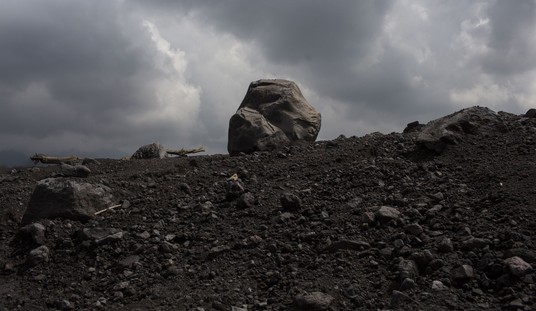Short answer: Probably not. Longer answer: Probably not, but with a member of the leadership talking tough and Democratic aides refusing to give lefty bloggers a straight answer when they’re asked if they have O’s back on this, no one knows for sure. I’d guess the odds of a revolt are 10 percent — but check back with me in a week if HHS misses the November 30th deadline to upgrade Healthcare.gov. If Obama can’t get that done, droves of Dems might decide to abandon ship.
Less than a day after the news broke that a deal has been reached putting a temporary hold on Iran’s nuclear program, influential Senate Democrats immediately moved to cast doubt on the compromise, predicting Dems would pass a new round of sanctions on Iran. One core question is not just whether Dems will pass sanctions, but whether they would take hold before the deal’s six month deadline. The White House fears both outcomes, but the latter one even more…
A senior Senate Dem aide declined to rule out the possibility that Dems could pass sanctions that take hold before the six month deadline. When I asked if that was still possible, the aide said: “Don’t know yet,” adding that it might not be “possible to get a new round of sanctions up and running faster than that.” Sanctions legislation that takes hold before or after the six month mark remains a real possibility…
As it is, the Obama administration is wary of additional Senate-imposed sanctions that would kick in even after six months. The administration’s position is a delicate balancing act: On the one hand, it argues that the six-month expiration date is a deadline in and of itself, meaning there is no need for Senate Dems to impose their own deadline. On the other, the administration wants to preserve flexibility in a scenario where both sides want to keep negotiating after the six month expiration date in the belief that a long term deal is within reach.
Iran’s foreign minister said this weekend that passing new sanctions means the deal is off. What if those sanctions don’t take effect unless/until the new six-month negotiation period ends without a final deal, though? Not clear yet, although the FM did say that “I think the West, particularly the U.S., needs to do a lot to at least partially restore confidence — the confidence of the Iranian people.” I read that as him saying that any further escalation, even if it’s delayed and conditional, would lead Iran to walk away, but maybe he’s bluffing. If Iran walks now and opens a new rift with the U.S., Netanyahu may seize the opportunity to attack before the rift can be healed. Israel’s paralyzed as long as this U.S.-Iran detente lasts and Iran knows it, so maybe they’ll accept conditional sanctions simply in the name of keeping the IAF grounded. What happens in the spring, though, when — as will almost certainly be the case — the six months is up and there’s no deal yet, and the White House decides it wants another six-month extension to keep working on one? Maybe Obama’s political stock will have rebounded to the point where congressional Dems are more willing to work with him then than now, but given what you know about the political landmines facing ObamaCare next year, how probable do you think that is? Are Democrats more likely or less to want to run on the Obama record six months out from the 2014 midterms?
Obama might be able to avert all this by simply vetoing the new sanctions Congress passes, of course, but that creates three new headaches for him. One: Does he really want to be seen singlehandedly torpedoing legislation passed with heavy bipartisan support aimed at a key U.S. enemy? He gets enough heat from the right for being too soft on Islamist outfits like the Muslim Brotherhood. The last thing he needs is to have Democrats suddenly grumbling about that too vis-a-vis a major terrorist power. Two: If he decides not to veto in the name of keeping congressional Dems more or less on his side, would the new sanctions actually weaken his hand in negotiating with Iran? The point of the sanctions in theory is to weaken Iran’s hand by frightening them with the prospect of even more economic pain if they don’t make a final deal with the U.S. before spring. Iran surely realizes, though, that the White House is at least as frightened at the thought of Israel bombing Iran’s nuclear infrastructure or, worse, the U.S. having to do it instead. Having new sanctions in the pipeline, waiting to go if there’s no deal in the next six months, means Obama will be even more desperate to strike a bargain before they take effect and push him into an even higher level of hostility with Iran. That could mean a lot of eleventh-hour concessions. Three: Er, what if O has no choice? The last time the House and Senate passed legislation aimed at Iran sanctions, they did it nearly unanimously. It’s quite possible that new sanctions would pass with veto-proof majorities, even with Dems knowing what a tough spot that would put Obama in. He screwed them royally in botching the ObamaCare rollout. What do they care if he suffers politically now?
My own take on the deal is that it achieves next to nothing but maybe doesn’t cost much either. If you’ve followed the Iranian nuke saga over the years, you know already that there are three enrichment benchmarks on the way to a bomb — five percent U-235 purity, 20 percent purity, and then 90 percent weapons-grade purity. You also know that most of the hard work in that process is getting from zero to five percent. Getting from five percent to 20 and then to 90 is fairly quick and easy. Iran just agreed, essentially, to give up its 20-percent pure uranium but to keep enriching at the five percent level. That’s no big concession. On the other hand, it may be a big concession by the U.S. to relax some of the sanctions on Iran temporarily. I’m unsure how the mechanics of loosening and then tightening sanctions work, but the group United Against Nuclear Iran thinks that loosening them even temporarily is a very big deal insofar as it’ll spur a rebound in the value of the rial that won’t quickly evaporate if/when sanctions are re-imposed in the spring. And that assumes that there’ll be political will internationally to reimpose them at all: More likely, western powers will want to keep the relaxed sanctions suspended to encourage rapprochement with Iran. Rouhani will say encouraging moderate-y things and “dialogue” will continue, even if the nuclear question remains unsettled. If Bibi thinks his job is hard now, imagine what it’ll be like in April.








Join the conversation as a VIP Member